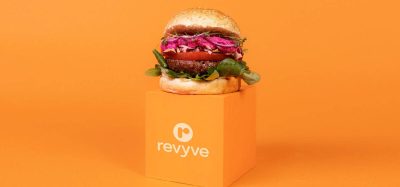New research may hold the key to perfecting vegan cheese alternatives
- Like
- Digg
- Del
- Tumblr
- VKontakte
- Buffer
- Love This
- Odnoklassniki
- Meneame
- Blogger
- Amazon
- Yahoo Mail
- Gmail
- AOL
- Newsvine
- HackerNews
- Evernote
- MySpace
- Mail.ru
- Viadeo
- Line
- Comments
- Yummly
- SMS
- Viber
- Telegram
- Subscribe
- Skype
- Facebook Messenger
- Kakao
- LiveJournal
- Yammer
- Edgar
- Fintel
- Mix
- Instapaper
- Copy Link
Posted: 15 January 2025 | Ben Cornwell | No comments yet
Canadian researchers have created a plant-based cheese with dairy-like melt, stretch and texture, bringing vegan cheese closer to perfection.


A demonstration of the team's plant-based cheese's stretchy properties. Credit: Alejandro Marangoni
For those embracing plant-based diets, the quest for a cheese alternative that mirrors the creamy, melty decadence of dairy has been something of a holy grail. Now, a team of Canadian scientists may be on the cusp of solving this culinary conundrum.
Scientists from the University of Guelph in Ontario and Canadian Light Source Inc. in Saskatchewan are working to produce plant-based cheese with all the characteristics of real cheese, but with better health benefits.
“Consumers expect essentially the same animal product but with plant-based ingredients, which is very difficult,” said Alejandro Marangoni, a key researcher involved in the project.
Their work, published in Physics of Fluids by AIP Publishing, studied multiple types of plant-based proteins and how they interact with alternative cheese scaffolds. The research takes into account the intricate qualities of cheese—its melting, stretching, and even the oil-release process when grilled or heated.
“The behaviour of milk proteins and meat proteins is reasonably well understood, but knowledge about the functionality of plant proteins is lacking,” says Marangoni. “There is also a huge variety of different plant proteins, each one very different from one another.”
To address this, Marangoni and his colleagues experimented with protein isolates from lentils, fava beans, and peas, combining them with varying proportions of coconut and sunflower oils. The result? A breakthrough blend that marries taste, texture, and nutrition.
Benefits beyond texture and taste
Their research found that increasing the coconut oil increased the hardness of cheeses, but cheese with pea protein and 25 percent coconut oil had the firmest texture due to their unique protein-fat interactions. This formulation matched or surpassed the melt, oil loss, and stretch of the cheese analogues made with 100 percent coconut oil.
The benefits go beyond texture and taste. By using a combination of coconut and sunflower oil, the team was able to lower the saturated fat content of the cheese, offering a healthier alternative to both traditional dairy and existing plant-based cheeses.
“Ultimately we want to improve the nutrition, increase the protein content, and lower the saturated fat content of cheese alternatives,” Marangoni notes. “But keeping all the functionality in there, which includes the melt and the stretch of the ‘cheese,’ is very difficult.”
As plant-based diets continue to grow in popularity, innovations like this could reshape the dairy-free market. With science on their side, the dream of a perfect plant-based cheese may soon be a reality.
Related topics
Ingredients, New product development (NPD), Plant based, Proteins & alternative proteins, Research & development, Sustainability, The consumer









